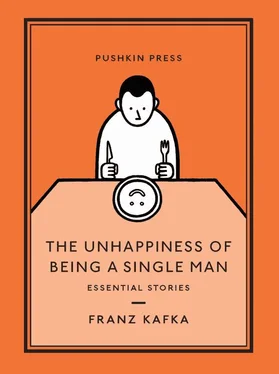And all the jackals around me, who had been joined by many more from further away, put their heads down between their forelegs and scrubbed them with their paws; it was as if they were trying to hide their disgust, and it was so horrible that I would have liked to leap right over them, out of their circle, and flee.
“So what do you intend to do?” I asked, and tried to get up. I couldn’t; two younger animals behind me had clamped their teeth into my jacket and shirt; I had no choice but to stay sitting. “They’re holding your train,” the old jackal explained seriously. “It’s a mark of respect.”
“Tell them to let go of me,” I shouted, turning back and forth between the old jackal and the younger ones.
“Of course they will,” said the old one, “if that’s what you what. It’ll take a little while, because, as is customary, they’ve bitten deep and will need a moment to unclamp their jaws. In the meantime, please hear our plea.”
“Your behaviour hasn’t made me especially well disposed to it,” I said.
“Don’t let our clumsiness count against us,” he said, and now for the first time, he employed his voice’s natural whine. “We’re poor animals, all we have is our jaws; for everything we want to do, good or bad, it’s our jaws or nothing.”
“So what do you want?” I asked, only a little mollified.
“Sir,” he cried, and all the jackals howled; I got a faraway sense that it was some kind of melody. “You must end the feud that divides the world in two. You are how the ancients described the one who would come to do that work. We must have peace from the Arabs; breathable air; our sight cleansed of their presence as far as every horizon; no more lamentation from the sheep the Arabs stab to death; all animals will die peacefully; we’ll drink them dry without being disturbed and clean them all the way down to the bone. Cleanliness, cleanliness is all we want”—and now they were all crying, sobbing—“How can you stand it in this world, with your noble heart and sweet innards? Their white is dirty; their black is dirty; their beards are a horror; the look of their eyes makes you sick to the stomach; and if they raise their arms, a veritable hell opens up in their armpits. That’s why, dear sir, oh, dearest sir, you must use your hands that can do anything, your hands that can do anything at all, to cut through their necks with these scissors!” He jerked his head and another jackal came forward; with one of his incisors he was holding a little rust-covered pair of sewing scissors.
“So finally the scissors—and that’s enough!” shouted the Arab leading our caravan, who’d crept up to us from downwind and now cracked his enormous whip.
They all ran away at once, but then huddled together again at a distance, the many animals so close together and so still that they looked like they were in a narrow pen with a strange light flickering around them.
“So now you’ve seen and heard this performance as well, sir,” said the Arab and laughed as happily as his people’s reticence allowed.
“You know what the animals wanted?” I asked.
“Yes, sir,” he said. “Everybody knows. That pair of scissors has been wandering the desert for as long as Arabs have existed, and it’ll wander along behind us until the end of days. It’s offered to every European who passes through so he can carry out their great work; each time, they think it’s this European who’s destined to do it. They’re full of crazy hope, these animals; they’re fools, real fools. That’s why we love them; they’re our dogs, lovelier than yours. Just watch: a camel died in the night and I’ve had it brought over.”
Four bearers came and dropped the heavy cadaver in front of us. Hardly had they done so but the jackals lifted up their voices. As if pulled irresistibly forward by invisible tethers, each of them inched closer, hesitating, their bellies brushing the ground. They’d forgotten the Arabs, forgotten their hatred; the all-eclipsing presence of the pungent carcass bewitched them. One of them was already hanging on to the camel’s neck and found its artery with the first bite. Each of the muscles in the jackal’s body pulled and jerked in its place, like tiny, frenzied pumps trying eagerly but hopelessly to extinguish an enormous fire. Soon the other jackals had piled up on top of the cadaver and set about the same task.
Then the caravan leader slashed his whip hard across their backs. They lifted their heads, between delirium and unconsciousness; saw the Arabs standing in front of them; got the whip again across their muzzles; leapt backwards and ran a little way off. But the camel’s blood already lay in steaming puddles, its body had been torn wide open in many places. They couldn’t resist; they came back; the leader lifted his whip again; I touched his arm.
“You’re right, sir,” he said. “We’ll leave them to their work; it’s time for us to break camp. Anyway, you’ve seen them now. Wonderful animals, aren’t they? And how they hate us!”
THE SILENCE OF THE SIRENS
PROOF THAT BASIC, even childish, methods can sometimes save you:
To protect himself against the sirens, Odysseus stuffed wax in his ears and had himself shackled to the mast. Of course, every other sailor before him could have done the same thing—except for those the Sirens had managed to seduce from far away—but the whole world knew that doing these things wouldn’t help at all. The Sirens’ song could pierce anything, and the passion of those they seduced would have burst through more than just some chains and a mast. But that’s not what Odysseus was thinking of, even though he’d presumably heard about it. He entrusted himself completely to a handful of wax and his chains, and sailed towards the Sirens full of innocent delight with his little trick.
But as it happens, the Sirens have a weapon even more terrible than their singing, namely their silence. It may never have happened, but it is at least conceivable that someone could save himself from their singing; not so from their silence. The feeling of being able to overcome them with your own strength and the consequent reckless hubris would overwhelm any restraint on earth.
And in fact, when Odysseus came, those terrible singers didn’t sing, whether because they believed that their opponent could only be reached by silence, or because the sight of the joy on Odysseus’s face as he thought about his wax and his chains made them forget all about their singing.
Odysseus, however, if I can put it like this, didn’t hear their silence; he believed that they were singing and that he alone was being protected from hearing them. At first, he saw their throats straining, their chests rising and falling, the tears in their eyes, their half-opened mouths, and thought that this was all part of the arias dying away unheard around him. But soon these things faded from his sight as he fixed his gaze into the distance; the Sirens all but melted away before his determination, and at the very moment when he was closest to them, his mind was already on other things.
But they—more beautiful than ever—stretched themselves and turned to follow him with their eyes, letting their gruesome hair blow in the wind and relaxing the grip of their claws on the rock. They didn’t want to seduce him any more, all they wanted was to gaze on Odysseus’s bright face for as long as they could.
If the Sirens had had a consciousness, that moment would have annihilated them. But as it was, they stayed there and Odysseus was the only one who ever escaped them.
A short postscript to this story has also been handed down. Odysseus, they say, was so cunning, he was such a sly fox, that even the goddess of fate couldn’t see into his heart of hearts. It’s possible—even though it goes beyond human understanding—that he actually did notice that the Sirens weren’t singing, and put on this whole performance as a shield against them and the gods.
Читать дальше












